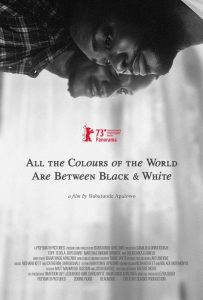
“All the Colours of the World Are Between Black and White”
(Nigeria)
Screened at the 41st Annual Reeling Chicago International LGBTQ+ Film Festival (4/5); Letterboxd (4/5), Imdb.com (8/10), TMDB.com (4/5)
Despite the considerable social progress that the LGBTQ+ community has made in recent years, there are still some places around the world where the act of coming out is questionable and deeply troubling. In some cases, such a step raises serious issues about social acceptance, as well as self-preservation and legal ramifications. It may even prompt some individuals to doubt their genuine intuitive impulses about their natural inclinations just to be able to fit in. Such is the case in Nigeria, as depicted in the debut feature from writer-director Babatunde Apalowo, a Nigerian-born filmmaker based in the UK. In his first feature release, Apalowo tells the story of Bambino (Tope Tedela), a motorcycle deliveryman who meets and befriends Bawa (Riyo David), an aspiring photographer with whom he starts spending considerable time, a connection that carries implications greater than just friendship. However, given the country’s social taboos and illegality considerations, as well as sustained pressure from Efeyinwa (Martha Ehinome Orhiere), a neighbor who wants to become Bambino’s wife, the budding relationship between the two men remains at arm’s length. Bambino has doubts about his own sexuality, while Bawa believes that he and his new companion are destined for something deeper and more meaningful. But will that happen? The film probes this question as the two men tenuously circle one another, trying to figure out what’s next. Admittedly, the pacing here can be somewhat on the slow side at times, but that’s understandable given the circumstances under which they’re operating. But, by taking this approach, the filmmaker has an opportunity to present their story in a highly sensual way, one that creates ample sexual tension that’s fittingly augmented by the picture’s carefully framed shots, many of which allow the actors to convey tremendous depth of feeling merely with facial expressions and body language. The tone, message and style of filmmaking are all reminiscent of filmmaker Barry Jenkins’s Oscar-winning best picture “Moonlight” (2016), a perspective that carries significant ramifications in a culture that often denies the very existence of gay individuals within its ranks. The film thereby provides a revelatory look into a segment of society that many don’t recognize, understand or acknowledge. Like this film’s American counterpart, however, it’s imperative that viewers have patience with this one, giving it time to develop and emerge with a story that’s heartfelt, eye-opening, and, above all, rewarding.




Leave A Comment